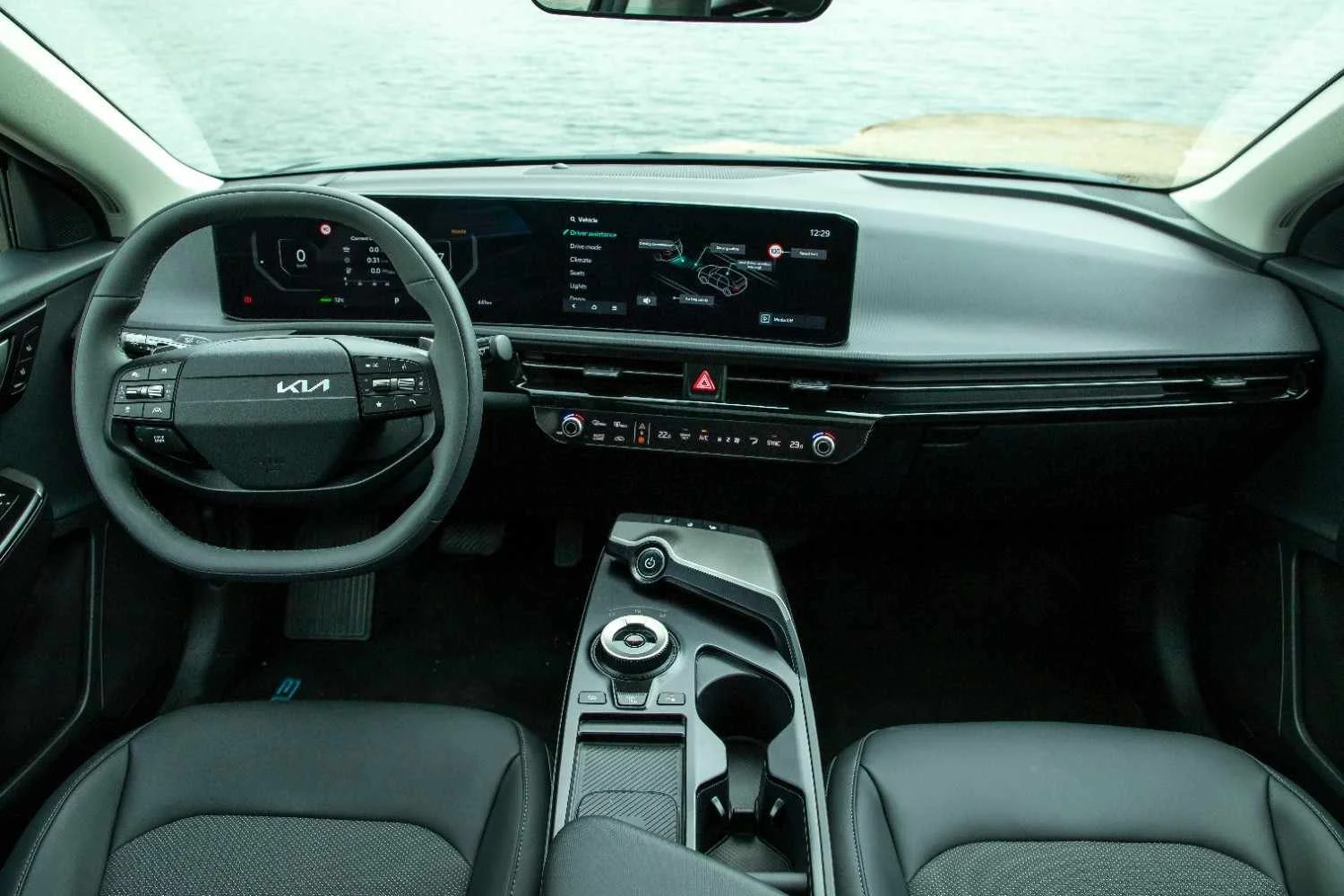A Complete Guide to the Different Types of Car Leases
Source: Shutterstock
There are five main types of car leases in the UK: PCH, PCP, HP, Business Contract Hire, and Salary Sacrifice. Each works differently in terms of payments, ownership, and tax benefits. When exploring car leasing options in the UK, understanding the different types of car lease agreements available can help you make an informed decision that suits your financial situation and driving needs. Each leasing contract offers distinct advantages, from flexible personal arrangements to tax-efficient business solutions and innovative salary sacrifice schemes.
What is Personal Contract Hire (PCH)?
Personal Contract Hire represents the most straightforward form of car leasing for individual consumers. With PCH, you essentially rent a vehicle for an agreed period, typically between two to four years, making fixed monthly payments throughout the contract term.
How PCH Works
Under a PCH agreement, you pay an initial deposit (usually equivalent to three to nine monthly payments) followed by fixed monthly instalments. The lease payment covers the vehicle's depreciation during your contract period, plus the finance company's charges and profit margin. At the end of the term, you simply return the car to the provider. This makes PCH particularly suitable for drivers who prefer the best electric cars to salary sacrifice through traditional leasing arrangements.
PCH Benefits
PCH offers several compelling advantages for personal use. Monthly payments are typically lower than other finance options because you're only paying for the car's depreciation rather than its full value. You'll drive a newer vehicle with the latest technology and safety features, often covered by manufacturer warranty throughout the lease period. Maintenance packages can be included, providing predictable motoring costs with no unexpected repair bills. For those considering electric vehicles, understanding how much it costs to run an electric car can help inform your leasing decision.
PCH Considerations
The main limitation of PCH is that you'll never own the vehicle, meaning no equity build-up over time. Mileage restrictions apply, with excess mileage charges if you exceed the agreed annual limit. You're also responsible for maintaining the car in good condition, with potential charges for excessive wear and tear upon return.
What is Personal Contract Purchase (PCP)?
Personal Contract Purchase combines elements of leasing and purchasing, offering more flexibility than traditional car leasing options. PCP has become increasingly popular due to its lower monthly payments compared to hire purchase agreements.
PCP Structure
A PCP deal involves paying a deposit, followed by monthly payments over the contract term (usually two to four years). However, unlike PCH, a significant portion of the car's value - called the Guaranteed Minimum Future Value (GMFV) or balloon payment - is deferred until the end of the contract. This balloon payment represents the predicted residual value of the vehicle. When considering electric vehicles through PCP, it's worth exploring Tesla salary sacrifice options for comparison.
PCP Flexibility
At the end of a PCP contract, you have three options: return the car with nothing more to pay (assuming you've stayed within mileage limits and the car is in good condition), pay the balloon payment to own the car outright, or use any equity in the vehicle as a deposit towards a new PCP deal. This flexibility is particularly valuable when considering Tesla Model 3 alternatives for your next vehicle.
PCP Costs
While PCP offers lower monthly payments than hire purchase, the total cost can be higher if you choose to purchase the vehicle. Interest is charged on the full purchase price throughout the contract, even though you're not paying for the balloon payment until the end. Understanding electric cars vs petrol cars costs can help inform your decision between vehicle types.
Hire Purchase (HP)
Hire Purchase represents the most traditional form of car finance, offering a clear pathway to vehicle ownership. HP agreements are straightforward: you pay monthly instalments over an agreed period, and once all payments are complete, you own the car.
HP Payment Structure
HP typically requires a deposit (usually 10% of the car's value), followed by fixed monthly payments over the contract term, commonly ranging from 12 to 60 months. The monthly payments are higher than PCP or PCH because you're paying for the entire vehicle value, not just depreciation or a portion of the cost. For those considering premium vehicles, exploring BMW salary sacrifice options might provide more affordable access.
HP Ownership Benefits
The primary advantage of hire purchase is guaranteed ownership. Once you've made all payments, the car is yours with no additional fees. This makes HP attractive for drivers who want to keep their vehicle long-term or those who exceed typical mileage allowances, as there are no mileage restrictions. However, good reasons to lease an electric car may outweigh ownership benefits for many drivers.
HP Considerations
Higher monthly payments make HP less accessible for some buyers compared to other leasing contract types. However, for those who prioritise ownership and plan to keep their vehicle for many years, HP can offer better long-term value. Consider why electric cars are more expensive when evaluating HP for electric vehicles.
Business Contract Hire
Business Contract Hire operates similarly to PCH but is designed specifically for companies and business users. This type of car lease offers significant tax advantages and fleet management benefits for businesses of all sizes.
Business Tax Benefits
Business Contract Hire provides substantial tax efficiencies. Companies can typically reclaim 50% of VAT on car lease payments (100% for commercial vehicles), and lease payments are generally allowable as a business expense for corporation tax purposes. This makes business contract hire particularly attractive for companies looking to provide vehicles for employees while managing tax liabilities effectively. Understanding employee benefits explained can help businesses evaluate comprehensive benefit packages.
Fleet Management Advantages
Business contract hire often includes comprehensive fleet management services, such as maintenance packages, breakdown cover, and administrative support. This can significantly reduce the administrative burden on businesses while providing predictable monthly costs for budgeting purposes. Companies considering electric vehicles should explore the best electric family cars to salary sacrifice for fleet applications.
Salary Sacrifice Car Schemes
Salary sacrifice represents an innovative approach to car leasing that's particularly beneficial for electric vehicle adoption. Under these schemes, employees agree to reduce their gross salary in exchange for a non-cash benefit - in this case, a leased vehicle.
How Salary Sacrifice Works
Salary sacrifice car lease schemes allow employees to lease a vehicle through their employer, with lease payments deducted from their pre-tax salary. This arrangement can result in significant savings on Income Tax and National Insurance contributions, making it one of the most cost-effective ways to access a new vehicle. Understanding how does salary sacrifice work is essential for maximising these benefits.
Electric Vehicle Focus
Salary sacrifice schemes are particularly advantageous for electric vehicles due to the low 3% Benefit-in-Kind rate for electric cars in 2025/26. This creates substantial tax savings compared to traditional leasing arrangements, with employees typically saving 20-50% compared to personal leasing. Exploring Nissan EV salary sacrifice options demonstrates the variety available through these schemes.
Comprehensive Benefits
Company electric car schemes often include insurance, maintenance, breakdown cover, and even home charging installation as part of the package. This comprehensive approach simplifies the entire process for employees while providing predictable monthly costs. Consider types of home EV chargers explained when evaluating charging solutions.
PCH vs PCP vs HP vs BCH vs Salary Sacrifice
| Feature | PCH | PCP | HP | Business Contract Hire | Salary Sacrifice |
|---|---|---|---|---|---|
| Monthly Cost | Low | Low | High | Low-Medium | Very Low |
| Ownership Option | No | Optional | Yes | No | No |
| Tax Benefits | None | None | None | VAT/Corp Tax | Income Tax/NI |
| Flexibility | Low | High | Low | Medium | Medium |
| Best For | Low mileage drivers | Flexible drivers | Long-term ownership | Businesses | Employees with EVs |
Monthly Cost Comparison
Salary sacrifice schemes typically offer the lowest effective monthly costs due to tax savings, particularly for electric vehicles. PCH and PCP provide lower monthly payments than HP, while business contract hire falls somewhere in the middle but offers corporate tax advantages. For detailed calculations, use an EV savings calculator tool to compare options.
Ownership Considerations
Only HP and the purchase option within PCP provide vehicle ownership. This is important for drivers who want to build equity or plan to keep their vehicle beyond the typical lease term. However, will electric cars be cheaper in the future suggests that ongoing technological improvements may favour leasing over ownership.
Tax Efficiency
Salary sacrifice arrangements offer the most significant tax benefits for individual employees, while business contract hire provides corporate tax advantages for companies. Understanding benefit in kind rates is crucial for calculating potential savings.
How to Choose the Right Car Lease Type
Selecting the most suitable car lease type depends on several personal and financial factors. Consider your budget, driving patterns, ownership preferences, and tax situation when evaluating different leasing options.
Budget Considerations
If monthly affordability is your primary concern, PCH or salary sacrifice schemes typically offer the lowest payments. For those comfortable with higher monthly costs but wanting ownership, HP provides a clear path to vehicle ownership. Exploring new EV salary sacrifice under £250 a month can reveal affordable electric options.
Driving Patterns
High-mileage drivers may prefer HP or the purchase option within PCP to avoid excess mileage charges. Those with predictable, lower annual mileage often find PCH or business contract hire more suitable. Understanding how to optimise your electric car's range can help maximise efficiency regardless of your chosen leasing type.
Business vs Personal Use
Companies should strongly consider business contract hire for its tax advantages and fleet management benefits. Employees have access to salary sacrifice schemes, which can provide exceptional value, particularly for electric vehicles. Learning about why investing in green benefits matters for businesses can inform corporate decision-making.
Future Flexibility
PCP offers the most flexibility at contract end, allowing you to return, purchase, or trade the vehicle. This makes it suitable for drivers whose circumstances might change during the lease term. Consider hybrid or electric options when planning your next vehicle transition.
Finding the Right Lease Type for Your Lifestyle
When considering a car lease transfer or evaluating your current lease arrangement, understanding which lease type best suits your specific circumstances is crucial. Different lease structures offer varying benefits depending on your driving habits, financial situation, and long-term plans.
Families with Children
Best lease type: Personal Contract Purchase (PCP)
PCP offers the perfect balance of flexibility and affordability for growing families. With lower monthly payments compared to hire purchase agreements, PCP provides access to larger vehicles without stretching the budget. The optional final payment means families can choose to purchase the vehicle if it continues to meet their needs, or simply return it and upgrade to a different model as children grow and requirements change.
Why PCP works for families:
Affordable monthly payments free up budget for other family expenses
Flexibility to switch from a compact car to an SUV or MPV as family size changes
Option to purchase provides long-term ownership potential
Avoids being locked into a vehicle that no longer suits evolving family needs
Access to newer safety features and technology with each upgrade cycle
First-Time Car Leasers and Young Drivers
Best lease type: Personal Contract Hire (PCH)
PCH represents the most straightforward entry point into vehicle leasing, particularly suitable for drivers who want predictable costs without ownership responsibilities. This lease structure eliminates concerns about depreciation, maintenance costs, and eventual resale, making it ideal for those new to car ownership or leasing.
Why PCH suits first-time leasers:
Lowest possible monthly payments for access to new vehicles
No long-term ownership risk or depreciation concerns
Predictable monthly outgoings aid in budget planning
Access to vehicles with full manufacturer warranties and breakdown cover
Ability to drive newer, more reliable cars than purchasing outright would allow
Simple return process at lease end with no residual value considerations
High-Mileage Drivers
Best lease type: Hire Purchase (HP) or PCP with purchase option
Drivers covering significant annual mileage face substantial excess mileage charges with traditional lease agreements. HP or PCP with a clear intention to purchase offers better long-term value, particularly for those driving 15,000+ miles annually.
Why ownership-focused leasing works for high-mileage drivers:
Eliminates excess mileage penalties that can reach £0.10-£0.30 per mile
Vehicle ownership means no restrictions on annual mileage
Better long-term value proposition for vehicles driven extensively
Ability to modify the vehicle as needed for work requirements
No concerns about excessive wear and tear charges
Potential for vehicle to retain value despite high mileage if well-maintained
Business Owners and SMEs
Best lease type: Business Contract Hire (BCH)
Business Contract Hire provides optimal tax efficiency and fleet management for company owners. The ability to reclaim VAT and offset lease payments against corporation tax creates significant cost advantages over personal lease arrangements.
Why BCH benefits business owners:
VAT reclaim on monthly payments (up to 50% for dual-use vehicles, 100% for business-only)
Corporation tax relief on lease payments
Predictable monthly costs aid in business budgeting and cash flow
Professional fleet management with maintenance packages available
No depreciation risk affecting company balance sheet
Simplified administration compared to vehicle ownership
Access to competitive commercial lease rates
Employees Seeking Affordable EVs
Best lease type: Salary Sacrifice Electric Car Scheme
Salary sacrifice schemes represent the most cost-effective route to electric vehicle ownership for employees, offering substantial savings through pre-tax salary deductions and minimal Benefit-in-Kind rates.
Why salary sacrifice maximizes EV affordability:
Savings of 20-50% compared to personal leasing through tax advantages
Current Benefit-in-Kind rate of just 3% for electric vehicles
Bundled insurance, maintenance, and breakdown cover included
No upfront costs or deposit requirements
Access to the latest electric vehicles with full manufacturer warranties
Simplified administration through employer payroll deduction
Complete Employer Protection against early termination risks
Eco-Conscious Drivers and Early EV Adopters
Best lease type: Salary Sacrifice (if available) or PCH
Environmentally conscious drivers benefit from the flexibility to upgrade regularly as EV technology advances rapidly. Both salary sacrifice and PCH offer access to the latest electric vehicle technology without long-term ownership commitments.
Why these options suit eco-conscious drivers:
Salary sacrifice schemes maximize EV affordability, encouraging wider adoption
PCH provides flexibility to upgrade as EV range and charging technology improves
Access to latest environmental technology and efficiency improvements
No concerns about EV resale values in a rapidly evolving market
Opportunity to experience different EV manufacturers and technologies
Contribution to reducing carbon emissions through regular vehicle upgrades
Professionals Who Change Cars Frequently
Best lease type: Personal Contract Purchase (PCP)
Career professionals who value driving the latest models benefit from PCP's flexibility and upgrade options. The structure supports a lifestyle of regular vehicle changes while maintaining manageable monthly costs.
Why PCP suits frequent upgraders:
Low upfront costs minimize initial financial commitment
Option to change vehicles every 2-3 years keeps pace with lifestyle changes
No resale complications or depreciation concerns
Access to latest technology and safety features
Flexible end-of-contract options support changing circumstances
Ability to purchase if a particular vehicle exceeds expectations
Budget-Conscious Drivers
Best lease type: Salary Sacrifice (if available) or PCH
Cost-conscious drivers prioritize minimizing monthly outgoings while maintaining access to reliable transportation. Both salary sacrifice and PCH offer the lowest effective monthly costs through different mechanisms.
Why these options maximize value:
Salary sacrifice delivers lowest effective cost through tax savings
PCH provides lowest monthly payments without ownership obligations
Predictable monthly payments eliminate unexpected repair costs
Access to newer, more reliable vehicles reduces breakdown risk
Warranty coverage provides peace of mind against expensive repairs
No depreciation risk or resale concerns affect personal finances
Making the Right Choice
When evaluating lease options, consider your:
Annual mileage requirements and potential excess mileage charges
Preference for vehicle ownership versus flexibility to upgrade
Tax situation and eligibility for salary sacrifice schemes
Budget constraints and desired monthly payment levels
Business requirements and potential tax advantages
Long-term plans and likelihood of changing vehicle needs
Understanding these factors ensures you select the lease structure that best aligns with your personal and financial circumstances, whether you're entering a new lease arrangement or considering a lease transfer opportunity.
What is the Most Popular Type of Car Lease?
Personal Contract Purchase has become the most popular form of car finance in the UK, accounting for approximately 90% of new car registrations through dealerships. Its popularity stems from the combination of affordable monthly payments and end-of-contract flexibility.
However, salary sacrifice schemes are experiencing rapid growth, particularly as electric vehicle adoption increases. The significant tax advantages available for electric cars through salary sacrifice are making this option increasingly attractive for employees seeking cost-effective access to new vehicles. Understanding electric vehicle trends and adoption patterns can help predict future market developments.
Business contract hire remains the preferred choice for companies, offering predictable costs and tax efficiencies that align with corporate fleet requirements. Many businesses are now considering the best electric cars to salary sacrifice as part of their sustainability initiatives.
The choice between different types of car lease ultimately depends on your individual circumstances, financial situation, and vehicle requirements. Whether you prioritise low monthly payments, ownership options, tax efficiency, or flexibility, there's a leasing solution designed to meet your specific needs.
For those considering electric vehicles, salary sacrifice schemes currently offer the most compelling value proposition, combining the benefits of driving a new electric car with substantial tax savings that make this option highly cost-effective compared to traditional car leasing arrangements. Exploring switching to an electric car can help inform your decision between conventional and electric vehicles.
Are you an employer?
BOOK A DEMOAre you an employee?
SEE AVAILABLE CARSYou might also like…
Last updated: 18/09/2025
Our pricing is based on data collected from The Electric Car Scheme quote tool. All final pricing is inclusive of VAT. All prices above are based on the following lease terms; 10,000 miles pa, 36 months, and are inclusive of Maintenance and Breakdown Cover. The Electric Car Scheme’s terms and conditions apply. All deals are subject to credit approval and availability. All deals are subject to excess mileage and damage charges. Prices are calculated based on the following tax saving assumptions; England & Wales, 40% tax rate. The above prices were calculated using a flat payment profile. The Electric Car Scheme Limited provides services for the administration of your salary sacrifice employee benefits. The Electric Car Scheme Holdings Limited is a member of the BVRLA (10608), is authorised and regulated by the FCA under FRN 968270, is an Appointed Representative of Marshall Management Services Ltd under FRN 667174, and is a credit broker and not a lender or insurance provider.
Copyright and Image Usage: All images used on this website are either licensed for commercial use or used with express permission from the copyright holders, in compliance with UK and EU copyright law. We are committed to respecting intellectual property rights and maintaining full compliance with applicable regulations. If you have any questions or concerns regarding image usage or copyright matters, please contact us at marketing@electriccarscheme.com and we will address them promptly.




